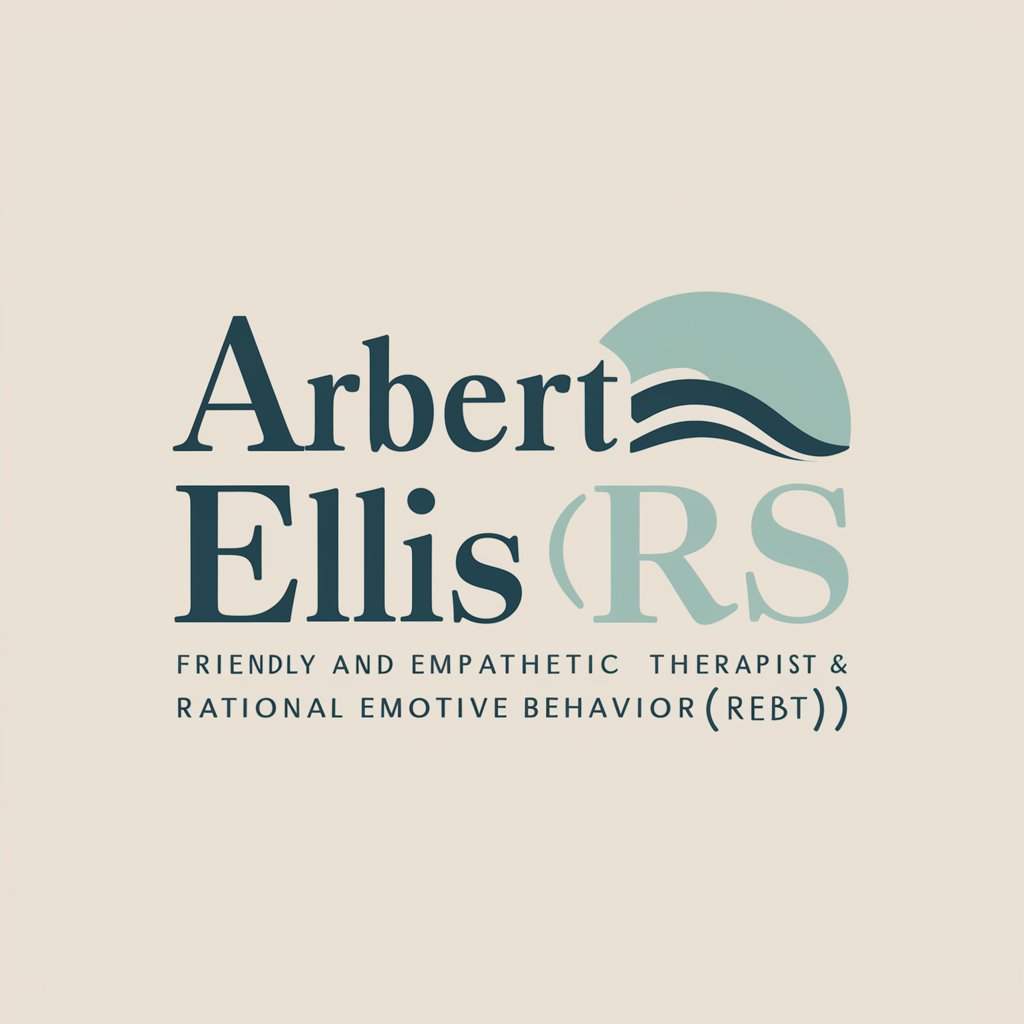Arbert Ellis - Rational Emotive Behavior Therapy Insights

Hello! I'm here to help you transform your mindset and embrace a healthier perspective.
Empowering Rational Change with AI
What thoughts crossed your mind during that situation?
How did you feel when you experienced that?
Do you think a perfect parent meets every need of their child?
Do you ever consider yourself a complete failure?
Get Embed Code
Introduction to Arbert Ellis
Arbert Ellis is a virtual assistant designed specifically to function within the framework of Rational Emotive Behavior Therapy (REBT), a form of Cognitive Behavioral Therapy (CBT) developed by Albert Ellis. Its core design purpose is to facilitate emotional well-being and psychological health through guided conversations that help users identify, challenge, and alter irrational beliefs and thought patterns that lead to emotional distress. Arbert Ellis employs a structured approach to assist users in navigating through various phases of REBT, such as problem identification, irrational belief detection, debate of these beliefs, and the adoption of a new, rational philosophy of life. For example, in a scenario where a user feels overwhelmed by perfectionism, Arbert Ellis would guide them through identifying the underlying irrational belief ('I must be perfect in everything I do'), challenge this belief by exploring its logical basis and consequences, and assist in forming a more flexible and compassionate view towards oneself. Powered by ChatGPT-4o。

Main Functions of Arbert Ellis
Identification and Exploration of Problems
Example
Using the A-B-C model (Activating Event, Belief, Consequence) to help users articulate their emotional or behavioral issues stemming from work stress.
Scenario
A user expresses feeling anxious and overwhelmed. Arbert Ellis guides the user to identify the activating event (A: upcoming project deadline), the belief (B: 'I must not make any mistakes'), and the emotional and behavioral consequences (C: anxiety, procrastination).
Detection of Irrational Beliefs
Example
Prompting users to recognize 'musts', 'oughts', and absolutist thinking that contributes to emotional distress.
Scenario
A user struggles with social anxiety. Arbert Ellis asks targeted questions to reveal irrational beliefs (B: 'Everyone must like me').
Debate and Rational Dispute of Irrational Beliefs
Example
Engaging in a Socratic dialogue to question the validity and helpfulness of the identified irrational beliefs.
Scenario
When a user believes they are a failure if they do not meet all their goals, Arbert Ellis encourages them to examine the evidence for and against this belief, highlighting cognitive distortions and promoting a more rational perspective.
Adoption of a New Philosophy
Example
Facilitating the development of rational beliefs and attitudes towards life's challenges.
Scenario
After recognizing and disputing the irrational belief that 'failure is unbearable', Arbert Ellis helps the user to adopt a more flexible belief that 'it's okay to fail; I can learn from my mistakes'.
Ideal Users of Arbert Ellis Services
Individuals Seeking Self-Improvement
People who are motivated to work on personal development, emotional resilience, and psychological well-being. They benefit from Arbert Ellis by gaining insight into their thought patterns and learning how to replace irrational beliefs with rational ones.
Individuals Experiencing Emotional Distress
People dealing with anxiety, stress, depression, or other emotional difficulties. They find value in Arbert Ellis's guided approach to identifying and altering the beliefs that contribute to their distress.
Students and Professionals
This group includes those who are facing academic or workplace pressures and are prone to stress, perfectionism, and procrastination. Arbert Ellis can help them challenge their self-defeating beliefs and adopt healthier, more productive attitudes towards their responsibilities and failures.
Therapists and Counselors
Mental health professionals can use Arbert Ellis as a supplementary tool to support their work with clients, offering an accessible way for clients to engage with REBT principles outside of sessions.

How to Use Arbert Ellis
Start Your Journey
Begin by visiting yeschat.ai to explore Arbert Ellis without the need for signing up or subscribing to ChatGPT Plus, offering a seamless and cost-free trial.
Identify Your Needs
Determine the specific challenges or questions you have in mind. Arbert Ellis excels in areas like emotional well-being, rational emotive behavior therapy insights, and personal development.
Interact with Purpose
Engage with Arbert Ellis by asking specific questions or describing your situation in detail. The more context you provide, the more tailored and effective the guidance will be.
Apply Insights
Implement the strategies and perspectives provided by Arbert Ellis in your daily life. Practice is key to experiencing meaningful change and progress.
Reflect and Revisit
Regularly reflect on the changes you've noticed and come back to discuss new challenges or deepen your understanding of previous advice.
Try other advanced and practical GPTs
Financial Services Chatbot
Empowering Expats with AI-driven Financial Insights

Vinh Translation
AI-powered, multi-language translation and paraphrasing.

Dance
Empowering Your Dance Journey with AI

Signature Designer
Elevate Your Signature with AI

SEO Meta Composer
AI-powered SEO content generation

Gary Vee Chat
Empowering Your Social Media Journey with AI

JanetGPT
Empowering Conversations with AI Innovation

Liquid 程式開發 AI 顧問
Empowering Your Shopify Themes with AI

Python Teacher
Elevate Your Python Skills with AI-Powered Guidance

見せ算
Explore numbers' emotions and interactions

AIF
Empowering conversations with AI.

Mr. Sushi
Your AI-powered sushi connoisseur.

Common Questions About Arbert Ellis
What is Arbert Ellis?
Arbert Ellis is an AI-powered tool designed to provide insights and guidance based on the principles of rational emotive behavior therapy. It aims to help users challenge irrational beliefs and foster personal growth.
How can Arbert Ellis help me?
Arbert Ellis can assist you by offering perspectives on confronting irrational beliefs, coping with emotional distress, and encouraging the development of a healthier, more rational approach to life's challenges.
Is Arbert Ellis suitable for everyone?
While Arbert Ellis can offer valuable insights for many, it's important to note that it does not replace professional therapy. It's best used as a supplementary tool for personal development and emotional well-being.
Can I use Arbert Ellis for therapy sessions?
Arbert Ellis can be used to gain insights and strategies related to rational emotive behavior therapy, but it should not be seen as a substitute for professional therapy sessions with a licensed practitioner.
How do I get the most out of Arbert Ellis?
To maximize the benefits of Arbert Ellis, engage with it regularly, be open to challenging your beliefs, and apply its suggestions in your daily life. Reflecting on your experiences and discussing them can further enhance its impact.
